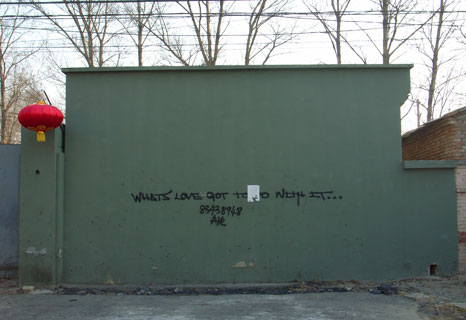
![]()
As creators, we can say that there is an audience for our work, whereby “public” is both an excuse and a reason. And yet as creators within a social sphere, our unabashed ability to colonialise spaces, and even publics, actually distances us from any notion of real interaction rather than that of working context-specific, conscientiously and in cohesion with those collaborating with us.![]() In the example of the bi/tri-ennial, the clearest cut form of discourse seems to lie not within the vocabulary of the host city, not within the realm of “the work” and at times hardly even within the actual processes of production. As recently overheard from an independent curator about the opening night party of the 2007 Shenzhen-Hong Kong Biennale of Architecture and Urbanism, “Well, that’s what we came for.”
In the example of the bi/tri-ennial, the clearest cut form of discourse seems to lie not within the vocabulary of the host city, not within the realm of “the work” and at times hardly even within the actual processes of production. As recently overheard from an independent curator about the opening night party of the 2007 Shenzhen-Hong Kong Biennale of Architecture and Urbanism, “Well, that’s what we came for.”![]() Chief curator of the Biennale Ma Qingyun is at a loss. “But we worked so hard…”
Chief curator of the Biennale Ma Qingyun is at a loss. “But we worked so hard…”![]() The bi/tri-ennial are event-based phenomenona, as new technology, “our latest project”, and another friday night scene. Critical exchange, then, takes a cue, as a breather after all that hard work—-at bars, the after-parties and nestled within the snide comments made during other people’s speeches. It is hard to understand what sort of feedback and interaction one can stimulate or expect from an event involving a mass public audience. “I hope they’ll collect the press clippings,” says one architect in the back of the taxi, on the way to a bar after the after-party. And yes, these traditional forms of review may still be helpful and necessary within a larger system of creative production. But the formality of a critic’s theoretical opinion or a blogger’s on-the-scene action shots bely the stagnancy of the actuality. The sponsor hotel where most exhibitors stay always makes for a much more active and dynamic space than that last exhibition hall.
The bi/tri-ennial are event-based phenomenona, as new technology, “our latest project”, and another friday night scene. Critical exchange, then, takes a cue, as a breather after all that hard work—-at bars, the after-parties and nestled within the snide comments made during other people’s speeches. It is hard to understand what sort of feedback and interaction one can stimulate or expect from an event involving a mass public audience. “I hope they’ll collect the press clippings,” says one architect in the back of the taxi, on the way to a bar after the after-party. And yes, these traditional forms of review may still be helpful and necessary within a larger system of creative production. But the formality of a critic’s theoretical opinion or a blogger’s on-the-scene action shots bely the stagnancy of the actuality. The sponsor hotel where most exhibitors stay always makes for a much more active and dynamic space than that last exhibition hall.![]() Where are the relationships between work, audience and creator within the framework of the art event? Are we merely using ideas as a way of colonialising the spectacle space? Working carries over into presentation carries over into documentation carries over into publicisation. And where again is the space for the work? Somewhere between making contacts and trying to catch hold of the installation team to get the right equipment.
Where are the relationships between work, audience and creator within the framework of the art event? Are we merely using ideas as a way of colonialising the spectacle space? Working carries over into presentation carries over into documentation carries over into publicisation. And where again is the space for the work? Somewhere between making contacts and trying to catch hold of the installation team to get the right equipment.
![]() This is not meant to bemoan the poor artist who tries to be simultaneously active in all of these areas of art production. Nor can we blame the event structure alone. But is it naïve to still long for project-based work that does not neglect the need for post-planning, responsibility and respect for the other?
This is not meant to bemoan the poor artist who tries to be simultaneously active in all of these areas of art production. Nor can we blame the event structure alone. But is it naïve to still long for project-based work that does not neglect the need for post-planning, responsibility and respect for the other?![]() Would it be possible to leave an event of this kind without a feeling of the morning-after?
Would it be possible to leave an event of this kind without a feeling of the morning-after?
somewhere not around you
 “The schizo knows how to leave: he as made departure into something as simple as being born or dying. But at the same time his journey is strangely stationary, in place. he does not speak of another world, he is not from another world: even when he is displacing himself in space, his is a journey in intensity, around the desiring-machine that is erected here and remains here. For here is the desert propagated by our world, and also the new earth, and the machine that hums, around which the schizos revolve, planets for a new sun. These men of desire—or do they not yet exist?—are like Zarathustra. They know incredible sufferings, vertigos, and sicknesses. They have their specters. They must reinvent each gesture. But such a man produces himself as a free man, irresponsible, solitary, and joyous, finally able to say and do something simple in his own name, without asking permission; a desire lacking nothing, a flux that overcomes barriers and codes, a name that no longer designates any ego whatever. He has simply ceased being afraid of becoming mad. He experiences and lives himself as the sublime sickness that will no longer affect him.” [Deleuze & Guattari, Anti-Oedipus]
“The schizo knows how to leave: he as made departure into something as simple as being born or dying. But at the same time his journey is strangely stationary, in place. he does not speak of another world, he is not from another world: even when he is displacing himself in space, his is a journey in intensity, around the desiring-machine that is erected here and remains here. For here is the desert propagated by our world, and also the new earth, and the machine that hums, around which the schizos revolve, planets for a new sun. These men of desire—or do they not yet exist?—are like Zarathustra. They know incredible sufferings, vertigos, and sicknesses. They have their specters. They must reinvent each gesture. But such a man produces himself as a free man, irresponsible, solitary, and joyous, finally able to say and do something simple in his own name, without asking permission; a desire lacking nothing, a flux that overcomes barriers and codes, a name that no longer designates any ego whatever. He has simply ceased being afraid of becoming mad. He experiences and lives himself as the sublime sickness that will no longer affect him.” [Deleuze & Guattari, Anti-Oedipus]
.but must i choose between truth and light, untruth and darkness? you and your sickness affect me, and so what then of it, you prick. must i take part, too, so long as you are happy? your cultural bullshit makes a we of i, but then what of the you? before it was about getting rid of this dance, the pronouns, because yes, we are all human, but your little hurricane can play with notions of society and take off when and if you please. what is wrong with choosing society, with wanting it, to take part in it, isn’t that here, too? i live it, plug into it every fucking day, on the bus, i wake up, step up, into, and fall back asleep again. some days are better than others. spring comes again. a mud ball shines like porcelain. i would like we to be happy, too. but if it’s my neurosis, your psychosis, still wanting to accept, just “somewhere not around you.” my love is a fucking wall right now, coupled with half-truths, awe-struck darkness and the grossest sadness. thanks for the process.
Posted by 丫 | more »